“Family Business”
Written by Ira Steven Behr & Robert Hewitt Wolfe
Directed by Rene Auberjonois
Season 3, Episode 23
Production episode 40512-469
Original air date: May 15, 1995
Stardate: unknown
Station log: Sisko is making chicken paprikash for dinner, which indicates to Jake that his father’s latest mission went well, since he only cooks Hungarian food when he’s in a good mood. Jake also tells Sisko that Kasidy Yates—the freighter captain he’s been trying to set him up with since last episode—is on the station.
Business is booming in Quark’s, which makes the proprietor that much crankier when Rom tells him that he gave Nog the night off to study for his Starfleet exams. Then a liquidator from the Ferengi Commerce Authority named Brunt shows up and places a writ of accountability on the bar. Quark and Rom are devastated, and the bar is quickly closed and evacuated. Brunt is doing an audit. After Quark bribes him, Brunt explains the charges against him: poor supervision of a family member. Quark probably thinks it’s Nog at first, but it turns out to be his and Rom’s mother, Ishka, who is earning profit. (Ferengi females are forbidden from earning profit.) Quark is responsible for getting her to confess to her crimes, make restitution, and reveal her accomplices. Quark and Rom are on the next transport to Ferenginar (with Quark asking Odo to keep an eye on the bar while he’s gone, which is hilarious). Quark doesn’t want Rom along, because he always takes Ishka’s side, but Rom insists.
Quark is not at all happy to be home, and he’s even less happy to see Ishka wearing clothes and addressing Brunt, a stranger. Brunt gives Quark three days, at which point she will be sold into indentured servitude and Quark will have to make restitution (though her profit is only three bars of latinum, so Quark can probably afford it, but still…). After Brunt leaves, Ishka makes it clear that she’s not signing the confession, nor removing her clothes.
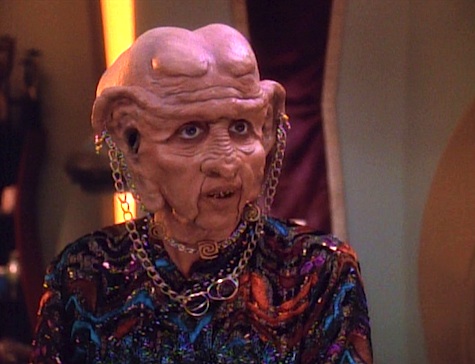
It becomes apparent to Sisko that Jake has told everyone about Yates—he’s asked about her by Dax in Ops and by O’Brien and Bashir as they’re trying (under Odo’s watchful eye) to break into Quark’s (still closed by the FCA) to retrieve their lucky dart board (though O’Brien insists they never called it their lucky dart board).
Rom serves dinner because Ishka isn’t feeling well. Quark is bitter about how she never chewed their food for them, not even when they were kids, and how the other children would make fun of them because their mother talked to strangers and didn’t masticate their dinner. Their father never earned much profit because he was so worried about Ishka’s eccentricities. Over dinner, Quark and Ishka argue and then Quark actually gets down on his knees begging her to confess for the sake of the family’s reputation. Later Rom tries his hand at asking her less confrontationally. But it’s too important to Ishka to be able to earn profit—she doesn’t care about the money as such, it’s the principle of the thing.
Sisko finally goes to meet Yates in the cargo bay. They’re both amused by Jake’s matchmaking attempt, and agree to meet for coffee.
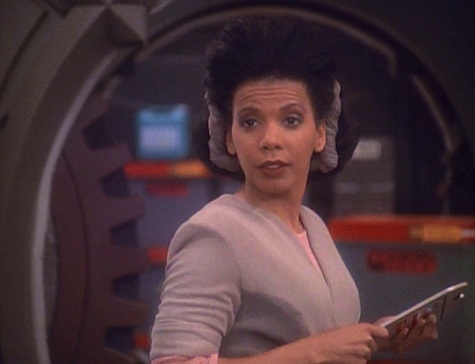
Quark discovers, to his dismay, that Ishka has earned a helluva lot more than three bars of latinum. She’s made so much profit that Quark couldn’t begin to make restitution. While Rom’s impressed that she has such good lobes for business, Quark is devastated. He screams at Ishka, who screams right back, revealing that her husband didn’t have the lobes for business, but refused to listen to Ishka’s advice, because she was a female. Quark storms out to inform the FCA about Ishka’s financial empire, but Rom stops him, telling him what Quark never knew, because Rom stayed home for ten years after Quark left Ferenginar: Keldar was a failure at business. “He couldn’t hold onto latinum if you sewed it into his pants!” They break out in a spectacularly lame-ass fight, which Ishka breaks up.
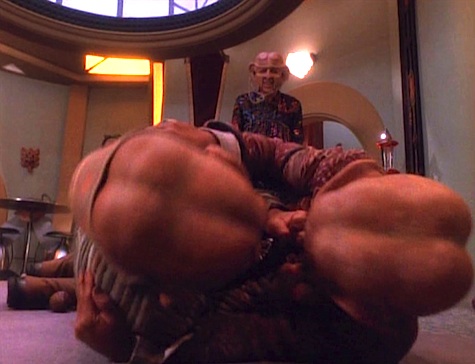
Quark goes to the Tower of Commerce (he walks up all 40 flights of stairs, unwilling to pay the seven strips of latinum for the elevator). While waiting to see Brunt (and after paying bribes to the secretary both to let Brunt know of his arrival and to be allowed to sit—sitting is three slips, but if you stay standing it’s one slip), Rom shows up with an offer from Ishka: splitting the profits 50-50. This intrigues Quark, and he puts off seeing Brunt. But Rom just said that to get Quark back to the house. He forces Ishka and Quark to sit and talk and work things out, pointing out to Quark that he treats Cardassians with more respect than his own mother and to Ishka that, if Quark can find her hidden profits, so can the FCA eventually. After yelling at them to work it out, Rom goes off to take a nap.
Ishka tells Quark that he’s too hard on Rom, but he replies that he had to be because she was too easy on him. But even if she’d pushed him, it wouldn’t have helped. Rom is like his father, with no lobes for business. Quark is more like Ishka—he not only memorized the Rules of Acquisition (one of Ishka’s proudest moments was when he got through all 285 without a mistake the first time), he understands them. Ishka is willing to give in and sign the confession for her son.
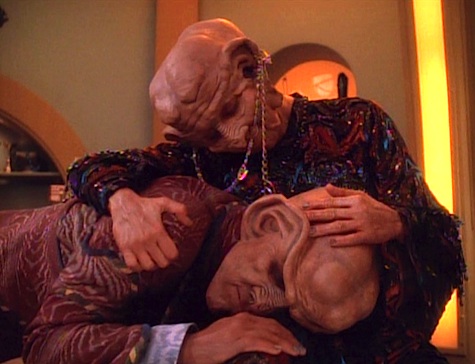
Sisko and Yates’s date goes okay, but Yates is preoccupied because she forgot that she was getting a transmission from her brother on Cestus III: an audio recording of a baseball game he’s playing. To Sisko’s joy and delight, they’ve revived baseball on that Federation colony, and they go off to listen to the game together.
Ishka signs the confession (while naked) and Brunt happily goes off, a hush bribe from Quark in his pocket. What Brunt doesn’t know (and neither does Quark, though Rom does) is that Ishka only admitted to about a third of what she actually made to the FCA.
The Sisko is of Bajor: After a huge nudzh from Jake, aided by the latter informing the entire senior staff about her existence and how he wants them to get together, Sisko meets up with Yates, and they hit it off, particularly once they discover a shared love of baseball.
The slug in your belly: Dax’s opinion of Yates after meeting her: “If I were Curzon, I’d have stolen her from you by now.”
Rules of Acquisition: Standard operating procedure for pretty much any official conversation on Ferenginar involves a bribe. When you enter a Ferengi’s house, you sign a legal waiver and deposit an admission fee; the owner says, “My house is my house,” to which the visitor replies, “As are its contents.”
No sex, please, we’re Starfleet: Jake’s matchmaking finally pays off, as Sisko and Yates have a coffee date.
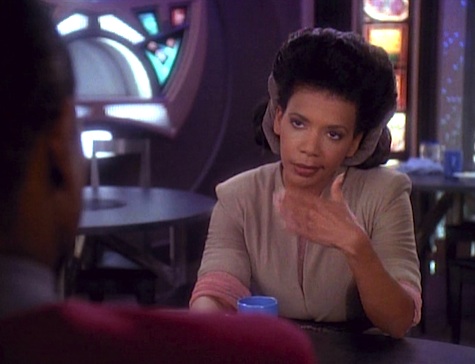
Keep your ears open: “How do you get to be an FCA liquidator?”
“Hard work, bribes, sucking up to the boss—just like any other job.”
Rom asking Brunt about his work.
Welcome aboard: Three recurring characters make their first appearance in this episode.
Penny Johnson (these days credited as Penny Johnson Jerald), last seen as Dobara on TNG’s “Homeward,” plays Kasidy Yates, who will remain Sisko’s sweet baboo (with some ups and downs) through to the end of the series. She’ll next appear (with a much less ridiculous hairstyle) in “The Way of the Warrior” at the top of the fourth season.
Jeffrey Combs, last seen as Tiron in “Meridian,” makes the first of eight appearances as Brunt. This is the first of three recurring characters for Combs, two of which are on this show, Weyoun being the other. He’ll also recur as Shran on Enterprise. His next appearance as Brunt will be in “Bar Association” next season.
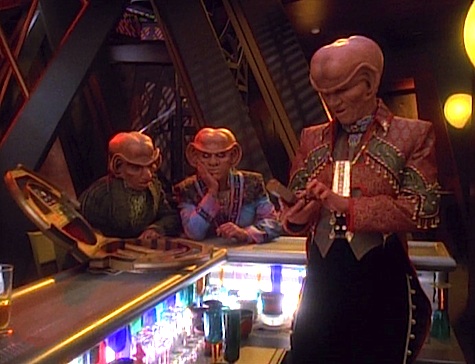
And the great Andrea Martin of SCTV fame appears as Ishka. This is Martin’s only appearance in the role—in all future appearances, starting in “Ferengi Love Songs” in the fifth season, Ishka will be played by Cecily Adams.
Plus we have Max Grodénchik as Rom.
Trivial matters: This episode marks the first appearance of Ferenginar, with its very humid weather and the hobbit-like dwelling places, as well as various and sundry customs of the homeworld, most of them involving bribes.
Brunt and Ishka also appear in Satisfaction is Not Guaranteed, your humble rewatcher’s contribution to Worlds of DS9 Volume 3. Brunt additionally appears in the novella Reservoir Ferengi by David A. McIntee in Seven Deadly Sins and as a younger man in Robert Greenberger’s Starfleet Corps of Engineers novella Buying Time. Ishka also appears in Greenberger’s Doors Into Chaos and in the Terok Nor novel Dawn of the Eagles by S.D. Perry & Britta Dennison.
Cestus III was established as a Federation colony that intruded upon Gorn space in the original series episode “Arena.” Apparently in the century since, it became a Federation colony once again.
Yates’s brother playing baseball on Cestus III will be a recurring theme. Your humble rewatcher fleshed out the Cestus Baseball League in A Time for War, a Time for Peace and Articles of the Federation and A Singular Destiny. The brother in question is named Kornelius in Articles.
The Pike City Pioneers’ home city is presumably named after Christopher Pike, Kirk’s predecessor as captain of the Enterprise from “The Cage,” “The Menagerie” two-parter, and the two JJ Abrams Star Trek films.
This episode formally establishes what was already obvious: that the runabouts are named after Earth rivers. In addition, Sisko is the one who picks the names when new runabouts are assigned. He dubs the newest one Rubicon (amusing, given that the last one was destroyed in “The Die is Cast,” a quote from Julius Caesar right before he crossed that river).
Walk with the Prophets: “Moogie!” First of all, I just have to say how much I absolutely adore the entire conception and design of Ferenginar: the tiny houses with rounded doorways that even the shrimpy Ferengi have to duck to get through, the constant rain, the ritual for entering a house involving fees, waivers, and a pile of towels to wipe your head of rain, and of course the bribes everywhere.
We also get an episode that challenges Ferengi sexism far more effectively than “Rules of Acquisition” did, as Ishka is obviously a revolutionary, one who sees no reason why her gender should affect her ability to make profit—especially given how good she is at it.
There’s also a genuine family crisis here that’s compelling viewing. The relationships among Ishka, Quark, Rom, and, as discussed, the late Keldar, are well drawn out, well portrayed, and help flesh out both Quark and Rom nicely. We already knew from “Civil Defense” that Quark left home at an early age, and we find out now that it was two decades ago—and Rom stayed home for another decade. Rom really gets to shine here—presaging his future career as a politician by manipulating Quark and Ishka into talking to each other—without ever losing his innate Rom-ness. I particularly love how he lectures his brother and mother, and then announces he’s going to take a nap.
In general, this episode works well as a Ferengi comedy episode because the comedy isn’t unnecessarily broad. It doesn’t always take the Ferengi entirely seriously as a culture, but doesn’t entirely mock it, either, and more to the point it takes the characters seriously.We get such great insights into Quark and his family. It’s particularly fascinating to see that he was raised by a strong-willed woman, given that the women he’s been attracted to (Natima Lang, Pel, that Boslic freighter captain, not to mention Kira and Dax) have also all been strong-willed.
And, not only do we get Ishka, we also get Brunt, who will be a delightful recurring antagonist, played with magnificent snottiness (and hilariously small lobes) by Jeffrey Combs. The whole concept of the FCA is a brilliant one, the perfect boogeyman for the average Ferengi.
Elsewhere, we have Jake’s entertaining matchmaking, made all the more delightful by the fact that Yates and Sisko hit it off pretty instantly when they meet in the cargo bay babbling about transporters, and then the deal is sealed when they bond over baseball. A pleasant start to what will be a cornerstone relationship in the series.
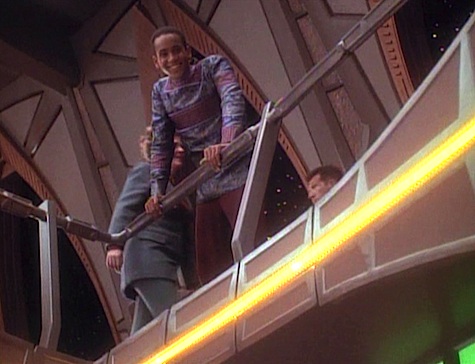
Warp factor rating: 8
Keith R.A. DeCandido’s latest novel, Gryphon Precinct, is now on sale from the fine folks at Dark Quest Books, and also via Amazon (trade paperback, Kindle, audio), Barnes & Noble (trade paperback, Nook), Indie Bound, or Kobo. This is the fifth book in the acclaimed “Precinct” series of fantasy police procedurals, following Dragon Precinct, Unicorn Precinct, Goblin Precinct, and Tales from Dragon Precinct.










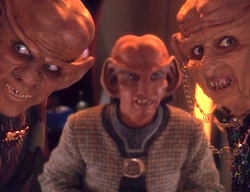
This is fun. Another great moment in Rom’s growth as a character, and some good family drama, funny yet believable. And I love the Ferenginar worldbuilding too. The institutionalization of bribes as just an everyday practice, like feeding parking meters, makes so much sense in context. (Parking meters, for what it’s worth, exist in large part to benefit businesses, by limiting the amount of time any one potential customer can take up a parking space and thereby increasing the customer traffic in a commercial area. Which I learned from the debate over a parking-meter privatization plan that was a central issue in last November’s local council race.)
It bothered me that Cestus III was established as a human colony. Part of the point of “Arena” was that humans had been wrong to settle Cestus III, that it was the Gorn’s rightful territory to begin with. It was a great episode because it challenged the assumption of human manifest destiny that otherwise tended to underlie the series. So having Cestus III just happen to be a human colony world a century later feels like monumentally missing the point.
@1, Fascinating explanation for parking meters; I never considered that, but it makes sense.
I think this may be the best of the Ferengi episodes (or second to “Little Green Men”). And the reason it works is that it is entirely character oriented. All the Ferengi stuff is just ornamentation and plot driver, it’s heart is the family dynamics. And we wind up with character growth for Rom and Quark and even Ferengi culture. It’s just too bad that they couldn’t get Andrea Martin for the role again. Nothing against Cecily Adams, but she had some mighty big shoes to fill and never quite made it. If the role had been hers to begin with, she would have owned it completely, but Andrea Martin claimed it utterly and forever here.
The fight scene between Quark and Rom is truly lame, but I bet a lot of that is due to the makeup. If they got too into it, they’d have had to spend hours back in the chair to repair the damage for every take. But it does make the scene that much better.
I really liked Kassidy, though I was unhappy with her character arc. I’ve heard that she came about because Avery Brooks was lobbying hard for a girlfriend for Sisko. He felt that it was time for him to set aside his grief and guilt and get on with his life. Sisko’s sexuality was one of the areas where Brooks tangled constantly with the execs, ultimately leading to a somewhat unsatisfying end to his character arc.
@ChristopherLBennett – That always seemed a bit odd to me, as well. I have to assume that the writers rolled the dice and picked a “familiar” name for Kasidy’s brother’s home, but I could have wished they’d made a better choice. Or else given us enough back-story to be willing to accept that maybe it’s a joint settlement of some sort. As it is, it would be a throw-away if they didn’t bring it up again at least once more in the future (and set Cestus III eight weeks away at the fastest speed Kasidy’s freighter can pull, a rare admission by Star Trek that space is big!)
In one of the short story collections, the settlement of Cestus III was negotiated over a baseball game between the Gorn and Human colonists. The Humans thought they would easily win, until it was revealed that Gorns have job-specialized dimorphism, and they wouldn’t be playing against the nerdy Gorn scientist types, but their warrior caste. Hilarity ensues.
@5: What story collection do you mean? I have most of them, but I don’t recall that story.
I just want to say that Chicken Paprikash is probably my favorite dish ever, and I’m super-delighted to see that people are still cooking it in the 24th Century. For those who don’t know, it’s kind of like Chicken and Dumplings (the dumplings in this case being made of spaetzle) with a cream-based soup (and paprikah, which is where it gets it’s name) instead of just plain chicken stock.
Manifest destiny is sometimes paid for. I suppose the Feds could have given the Gorn something for Cestus III after the Metron incident.
Omaha steaks are nice. Maybe a tin of popcorn. Nah, probably lettuce. Lizards like lettuce.
For some reason it always really stuck with me, in a good way, that it was Jake who lobbied so hard for his father to start dating again. A lot of times it’s an easy way out for family angst, to have the kid feel as though their parent is “cheating” or “forgetting” the lost spouse (and that’s fairly common, and valid, for many children to work through such feelings). At the time, it spoke a lot about the Siskos’ relationship, and Jake’s maturity, that he met a woman who he KNEW would be perfect for his dad and worked to make sure they at least got a chance to meet and click.
I always liked the relationship, and how it progressed, though at the end I can see why Brooks was so annoyed with how they ended the series and his character’s arc. I was pretty upset by it myself, and hold onto that promise of “maybe yesterday.”
LynMars: You should read Unity by S.D. Perry. :)
—Keith R.A. DeCandido
Keith, you mentioned it in passing in the summary but didn’t cite to one of the most delightful little tidbits of Ferengi culture that sheds so much light on everything Ferenginar – of course they would charge a fee for an elevator! It’s just a miserly, chiselling little thing that speaks volumes. The writer who came up with that is a genius and has kept me amused for almost 20 years.
The fact that the females are kept unclothed also makes sense if we posit that Fenenginar is moist, sultry tropical place…. although I do resent single-biome planets…. sigh.
LadyBelaine: One of the things I had fun with in my “Ferenginar” short novel in Worlds of DS9 Volume 3 was the head of a pharmaceutical company complaining that sales of bronchial remedies were down because women were walking around clothed, so they weren’t getting sick as often.
—Keith R.A. DeCandido
I too, love this episode. I may be in the minority, but I am a fan of the ”Ferengi Comedy Episodes” because they were a nice break in the action at times and any opportunity for Armin and Max and later Aron to shine is a good one, I think.
An in universe question generated by this episode, and maybe someone will be able to come up with a good explanation for it, but it seems to me that if it’s constantly raining on Ferenginar, shouldn’t it be a completely flooded water world by now, assuming the rain has been constant over geologic time? With rain like that, one would think the surface would be many miles below the water. I’m not understanding how that works, maybe someone on here has an idea? Thanks in advance.
Of course it couldn’t be raining over the entire planet constantly at every moment. But there are places on Earth that receive rainfall on as many as 350 or more days per year. Perhaps the populated parts of Ferenginar are in high-rainfall areas due to the geography of the planet, and the low-rainfall areas are mostly over the oceans or uninhabitable terrains. The rainwater would flow back to the oceans and evaporate into the clouds, maintaining the cycle.
Ok, I can buy that. Thanks!
I loved this – not just because I enjoy seeing Ferengi feminism in action (and it is kind of interesting to me in that they made Iskha a character who still buys into the other aspects of Ferengi culture – she still accepts the emphasis on profit as a good – which in my opinion is more realistic than just having her reject her entire culture as a whole) but I really did enjoy the family dynamics and exploring, and the reveal that while Kheldar may not have been great at business, he (and Rom) does have other good qualities that Iskha appreciates (so in that way, perhaps Ishka is still more progressive in terms of how she views what makes a ‘valuable’ Ferengi).
@14, Yeah, I’ve always seen Ferenginar as the Seattle of the Alpha Quadrant. :)
Just catching up on this rewatch and really enjoying it – so thanks toour humble rewatcher!
I wonder if the idea of charging for every little thing was inspired by Philip K Dick – in one of the novels (is it Ubik?) the protagonists have to pay fof everything – to open the doors, to activate the toaster, even in their own apartments…
Very good episode. Love Rom’s ultimatum to his mother and brother, and his nap announcement.
I wonder why the Ferengi never invested in a weather modification net? In True Q, we found out those things can disperse tornados, as well as turn geologically unstable jungles like Risa into a paradise.
@20/David Sim: Maybe the Nagus and the legislators rely on the financial support of the Ferengi Umbrella Association’s lobbyists.
I usually don’t like Ferengi episodes, but I thoroughly enjoyed this one, especially the worldbuilding. Often Star Trek alien cultures are just like us, but not this time. Perhaps the writers try harder when there’s no similar Earth culture available?
@22/Jana: Oh, there’s definitely a similar Earth culture — ours. The Ferengi were created as a satire of American capitalism and sexism. And the current administration in Washington is more Ferengi-like than ever.
@23 There was a line from Bar Association, I think, where Rom says that every Ferengi worker’s dream is not to stop exploitation but to become an exploiter. It is so similar to the right wing mantra of every poor person just being a temporarily impoverished millionaire. Both points of view ignore the massive reality of the system which needs the vast majority of the population to never stop being among the exploited or the poor and includes fundamental blocks to progress to keep them in place.
I never look forward to Ferengi episodes, and then Armen Shimmerman shines all over the place in every one and makes me love them. All the actors and their relationships in this episode shone and it was just such a great story about family, traditions, and pushing against the status quo. Most of my thoughts have already been stated but I’ll use this opportunity to talk about how much I love Quark’s wardrobe. It is so stunningly visually appealing and well tailored (and really only works on him – it would look funny on a hew-mon).
The other thing that I enjoy about the Ferengi – and another reason this show still holds up amazingly well – is how do you work things out with a culture that is so vastly different from yours that you can’t help but see each other as “wrong” at the core? There are plenty of ways to agree to disagree with friends over politics, religion, family, etc., but some differences are so fundamental (‘women shouldn’t be allowed to work’) how do you possibly make it work in one society? DS9 doesn’t have the solution either, but they just show everyone trying to muddle through, which makes it feel so realistic.
I love Quark’s wardrobe.
Ahhh the marvelous evolution of the Ferengi! From capitalist caricatures to a society with far more depth than I ever would have thought possible while still maintaining the farce. Also, I have no clue if the original idea for their look gave any thought whatsoever as to what their homeworld might be like. Nonetheless, this first look at Ferenginar was entirely believable that it would produce a race of beings like them. Everything about the Ferengi just came together so perfectly in this episode as if it was planned from the beginning.
It’s a shame Andrea Martin couldn’t deal with the Ferengi makeup and thus didn’t reprise her role in later episodes. I thought she was a better Moogie than the late Cecily Adams who replaced her. Although, I do feel that as the series went on, Adams improved in the role significantly.
As for the Cestus III, issue: When I first saw this episode, I didn’t even think of the Federation having a new colony on Cestus III in any kind of negative connotation. I just assumed that a peaceful compromise had been reached between the Federation and Gorn.
@27/Thierafhal: “As for the Cestus III, issue: When I first saw this episode, I didn’t even think of the Federation having a new colony on Cestus III in any kind of negative connotation. I just assumed that a peaceful compromise had been reached between the Federation and Gorn.”
That’s the whole problem: Just assuming. When you just assume, you tend to default to the assumption that your side is in the right and should get what it wants. The brilliance of “Arena” was that it started out playing into the audience’s assumptions and then overturned them, forcing the viewer to question those pat assumptions. So when the DS9 writers “just assumed” that the Federation had been the ones who got to keep Cestus III (even though it was the Gorn’s rightful territory in the first place) and let the audience “just assume” the same without question, that was missing the point of “Arena,” its challenging of our self-serving assumptions.
@27/Thierafhal: “I just assumed that a peaceful compromise had been reached between the Federation and Gorn.”
I’d say that assumption is in the spirit of the original episode. After all, the last thing Kirk said to the Metron was: “We can talk. Maybe reach an agreement.”
@28. CLB: Well as I said, this was when I first saw the episode, it did not occur to me to analyze it in any way back then. And also, I was 15 years old, lol. My assumption was an innocent one that was in tune with the spirit of Star Trek. That’s not to say that I don’t understand your point of view, however.
@29. JanaJansen: Exactly, and that is the part of Arena that stood out for me.
@29/Jana: Yes, but why assume that agreement meant the Federation got the planet when it was the Gorn’s in the first place? That’s my point. It’s ethnocentric to assume our side always gets the win even when we were in the wrong. Logically, objectively, the ideal settlement would be that the Federation admitted its mistake and let the Gorn have their planet back. It’s hard for our Western brains conditioned by centuries of cultural imperialism and Manifest Destiny to contemplate the notion of not getting to keep a territory we stole, but the point of “Arena” was to push back against that kneejerk mindset, and then DS9 fell right back into the same unthinking colonialist mentality.
@31/Christopher: Hey, why assume that I assume that the Federation got the planet? :-)
I think it is likely that the Gorn got the planet. As you say, it was the Gorn’s in the first place, and everybody in the episode acknowledged that. But we also know that the Gorn didn’t go there often, and that the Federation colony was a useful addition to the neighbourhood (“Scanners reported a ship approaching. We get them now and then. They’re all welcome to use our facilities.”). So what I actually assume is that the agreement included a permit for a Federation exclave on Gorn territory. Classic win-win.
Of course I don’t know if the DS9 writers thought along the same lines.
@32/Jana: That’s my point — I’m critiquing the DS9 writers’ lazy assumption, saying it was a bad storytelling choice on their part. Sure, you can fix the writers’ mistake after the fact — I’ve done plenty of that in my Trek novels — but that doesn’t mean it wasn’t a mistake.
@33/Christopher: I didn’t really intend to fix the writers’ mistake, I rather assumed that this was the intended reading. It seemed a likely outcome after the events of “Arena”. To me, anyway.
@34/Jana: I just don’t see any evidence that that was the writers’ intention. They never gave any indication that Cestus III was anything but a Federation world. The one and only time they ever mentioned the Gorn in DS9 was in the context of Kirk fighting them, which makes them sound like the bad guys.
@35/Christopher: Perhaps you’re right. It never occurred to me that Cestus III could be anything other than a Gorn planet, so I automatically interpreted the new information accordingly.
On a related note. I like to think that the Maquis worlds really were Cardassian territory. Like if America found out that Russian citizens were setting up home on some of those uninhabited islands in Maine or Alaska, and calling in the Russian military for help. America would be pissed and demand they get moved, what if the Cardassians are just Alaskans or Maniacs (I don’t know the correct term for people from Maine, but somehow that sounds right [g])?
@31: There’s no indication in the episode Arena that the Gorn had any sort of settlements on Cestus III itself. (The Gorn captain describes it as being in Gorn space but never says it’s a Gorn settled world. And just because the Gorn claim an uninhabited world does not mean they have any actual right to that world. (Just as the Dominion has no legitimate right to claim the entire Gamma Quadrant and the Romulans don’t have any legitimate right to claim all that is within their field of vision.) Thus there is nothing inappropriate about the Federation and Gorn reaching a treaty where the Federation gets to keep Cestus III (a world that the Federation settled before the Gorn did.)
@37/random22: “Journey’s End” indicated that the territorial exchange was part of the treaty settlement ending the war. That implies, perhaps, that the treaty required both parties to return territories they’d seized from each other during the war, and that the border was being returned to its pre-war configuration. But if it were that simple, it seems it wouldn’t have been so contentious an issue that it took 4 years to settle the treaty (from a year before “The Wounded” to just before “Journey’s End”). The impression was that both sides made territorial concessions in exchange for other treaty provisions, a “land for peace” arrangement, so what they gave up might’ve been more a matter of what territory the other side found desirable rather than what they had a prior claim to.
@38/bguy: In-universe, you make a good point. But I’m talking metatextually — not about the “facts” of the story, but about its message. I’m saying I feel the DS9 writers’ choice to put Cestus in Federation hands feels like it undermines the anti-colonialist message of “Arena,” or at least overlooks it.
@38/bguy: “The Gorn captain describes it as being in Gorn space but never says it’s a Gorn settled world. And just because the Gorn claim an uninhabited world does not mean they have any actual right to that world.”
If it’s in Gorn space, they do. The characters’ reaction shows that this is Federation policy.
Why would every world need to be settled, anyway? For all we know, Cestus III could be a Gorn nature reserve. Or perhaps the Gorn are space nomads and live on their planets on a rotating basis.
random22: Folks from Maine are called “Mainers,” FYI.
—Keith R.A. DeCandido
@39: Was Arena’s message really anti-colonialism though? After all the Federation honestly did not know they were intruding in someone else’s claimed territory in Arena. That’s very different from historical colonialism where the colonizing powers knew full well they were encroaching on native populations and simply did not care.
Arena’s message seems to be more about not immediately assuming the worst about other people then it really does against colonialism.
@40: “Why would every world need to be settled, anyway?” Because in the absence of a treaty between two powers which sets out established borders, the presences of settlements is the quickest, cleanest, clearest way to tell when another power has claimed a planet. And while there could certainly be situations where an interstellar polity is using/has a special interest in an unsettled planet, it is a lot less reasonable for said polity to assume hostile intent and respond with immediate and deadly force to trespassing on a claimed planet if they do not have any actual physical presence on said planet.
As for Federation policy, in the very episode Spock basically states it will be up to the diplomats to determine if Cestus III is legitimate Gorn territory or not. That suggests it takes more than an alien power simply claiming an unsettled planet for the Federation to recognize that claim as legitimate. (Which is certainly consistent with the subsequent serieses where the Federation frequently flouted the expansive territorial claims of other powers.)
@42/bguy: I agree that it has to be determined whether the Gorn captain’s claim is legitimate. That’s why I wrote “if it’s in Gorn space”.
I also agree that the Gorn’s reaction was excessive. That’s actually one of the things I like about the episode – the Gorn are not nice, and talking to them is still portrayed as the right thing to do.
But we don’t know if their reaction was unreasonable, from their point of view. What happened was a classical misunderstanding between members of different cultures. Perhaps they put up signs which they considered sufficient, but which the Federation colonists never noticed. Perhaps they never expand into a new solar system without monitoring it for years first, and expect the same behaviour from others. They’re aliens. Their behaviour and their assumptions could be different from ours in any number of ways.
@42/bguy: “Was Arena’s message really anti-colonialism though? After all the Federation honestly did not know they were intruding in someone else’s claimed territory in Arena. That’s very different from historical colonialism where the colonizing powers knew full well they were encroaching on native populations and simply did not care.”
I think that’s defining it too narrowly. What “Arena” did was to start off playing into the reflexive assumption that the humans were good guys defending their rightful territory and the scary croc-men were evil brutes out to destroy us, and then to flip that around and reveal that the scary croc-men were the defenders and saw us as the invaders. So it challenged our kneejerk presumption of our own rightness and entitlement. And yes, that is anti-colonialist, because colonialism is not just an action, it’s a belief system, a way of looking at other cultures relative to one’s own.
After all, you’re wrong — a lot of colonialists did care. They didn’t see themselves as “encroaching” — they saw themselves as helping, as bringing enlightenment and civilization and development and progress. And it was because of that unquestioning certainty in their own rightness that they wrought massive destruction on other people’s cultures and ways of life. “Arena” taught humility. It taught that your own side can be wrong. And that is the antidote to colonialism.
And then DS9 went and just glibly chose Cestus III as the name of a Federation world and just unthinkingly, lazily trampled on that important message like a careless driver running over their grandmother’s prize azaleas.
To the Gorns humans probably look like the stuff of nightmares too. We are all spindly and our limbs are all jerky, and the way we seem to move so quickly compared to them. With tiny beady little eyes, and we communicate in this string of musical babble. I mean, talk about creepy.
But maybe, just maybe, by the time of DS9, those weird little bug people and the giant crocodile snarly people; maybe they’ve just become people and found a way to settle down together and share that world that was once almost a warzone? Do we know it is definitely a Federation world? I know Sisko says it is on the other side of the Federation, but he is clearly referring to a location and travel time than a political statement. I like to think it is just this place that is its own special thing, there are Gorn, there are Humans, there are a few other races, all just chilling out together.
@45/random22: I saw a Facebook post once excerpting a thread on some other social network (hard to keep track of them all) where someone pointed out that humans are exceptionally good endurance runners/stalkers compared to most species, that where most are capable of only short bursts of activity before having to stop, we can just keep going and going for hours, even days on end until we finally catch up with our exhausted prey. And someone replied by talking about how terrifying that would make us to aliens. We’re basically the Terminator.
And for the nth time, I’m not talking about whether the situation can be rationalized in-universe. Anything can be rationalized in-universe. I’m talking about whether it was a good idea in REAL LIFE to write the story that way in the first place. The writers could’ve easily picked a different TOS planet to name-drop for Kasidy’s brother’s baseball team, one that wouldn’t have so carelessly stepped on the moral of such an important episode.
@45/random22: I want a Star Trek children’s show set on that planet. As soon as the current predilection for nastiness is over.
@46/Christopher: Or if they wanted a callback to the episode, they could have mentioned the Gorn too. Sisko and Kasidy’s talk about baseball would have been a perfect opportunity. “How many teams are there?” – “Six, four human and two Gorn teams.”
Okay, I’m not sure if the Gorn would be any good at ball games, being slower than humans and all that. Perhaps this would be better: “Six, all human. The Gorn don’t play ball games, but they make great spectators.”
@46
I think the thread you are looking for is this one:
https://www.mmo-champion.com/threads/1787902-Humans-are-the-terminator
@47
Gorn would be awesome blockers in NFL football.
@48/random22: Yes, that’s the one.
Glad to see some pushback on the idea that the Gorn were unequivocally the wronged party in “Arena.” I’m not sure how this came to be gospel in online Trek criticism, because in the actual episode, the only evidence that Cestus III belonged to the Gorn is the bare assertion of the Gorn captain. We wouldn’t accept this from the Dominion, the Cardassians, or the Klingons, so I’m not sure why we’re expected to accept it from the Gorn, especially since they clearly hadn’t colonized the planet themselves or even visited it very often. Maybe they do have a legitimate claim, or maybe they claim every star they can see from their homeworld, or even the entire galaxy. We don’t know, and there’s no information in “Arena” that we can use to determine the truth. So I really don’t think all the reflexive Federation-bashing is called for. For my part, I prefer to believe that the Federation and the Gorn came to a peaceful agreement and jointly settled the planet.
@51/Gaius: It’s not about the in-story “facts,” because this is fiction. What matters is how stories work and what ideas they’re meant to express. The message of “Arena” is not to judge by appearances or first impressions. As with “The Devil in the Dark” (also by Coon), the theme is that what appears to be an evil monster may actually have motives no different from our own, and that there are grounds for understanding even the most alien entity if we stop and listen rather than just reacting. So the premise that the Gorn were actually just as much the villains as Kirk initially assumed may not contradict the surface facts of the story, but it completely misses the message of the story.
That’s not “Federation-bashing,” because the idea is that nobody has to be “bashed,” that it’s simplistic to assume there has to be a villain in every interaction. The two sides in a conflict can both be right, or both be wrong. Both sides can make bad decisions that are sparked by legitimate, forgivable motivations. That’s what implicitly happened here — both sides mistook the other for an aggressor and overreacted with violence rather than taking the time to listen and understand.
This is just me, but speaking as a man whose mother died and whose father remarried soon after, I have always found Jake’s interest and active hand in his father’s love life to be intensely bizarre and off-putting. Especially given how raw and recent the memory of his own mother’s death is for the family.
@53/Prof. Lemonade: At this point, it’s been nearly 5 years since Jennifer Sisko died. I wouldn’t call that recent. And it was never meant to be “raw.” The whole idea of “Emissary” was that Sisko was clinging unhealthily to his grief at a loss that had happened more than two years before, that he wasn’t letting himself heal and move forward with his life. Learning that lesson was the beginning of his arc in the series, and this is nearly three seasons later.
@54/ChristopherLBennett: That’s a very fair point. Something about his enthusiasm to set his dad up still always seems strange to me, though.
@55/Prof: Jake wanted his father to be happy. That seems quite healthy to me.
@56CLB: Maybe it’s because so many young people are uncomfortable talking with their parents about sex and relationships and thinking of their parents as sexual beings. But it’s a portrayal of a more enlightened future, so I guess I’m willing to accept that they’ve moved beyond that.
@57/Prof: That’s part of it, but partly it’s just that Jake is completely unselfish in his love for his father. He’s not the kind of kid who’d resent his father dating because he’s still loyal to his own mother or because he’s uncomfortable thinking about it. He gets that it’s not about him. He just wants his dad to be happy.
Lockdown Rewatch. By far the best Ferengi episode up to this point, lovely little touches on things like how the doors are designed so anyone entering a dwelling is forced into the Ferengi cringe. The first appearance of Brunt is a highlight and although he isn’t given that much in this episode Jeffrey Combs gets the absolute most out of every scene, he was always coming back after this performance. Armin Shimerman and Max Grodénchik are as ever excellent, Rom is one of my favourite characters ever and steals every scene here. Ishka makes a good impact here and even though the actress changes after this for me it’s hardly noticeable. The B plot is also good, instant chemistry between Avery Brooks and Penny Johnson and some good comic support from the rest of the regulars, I particularly enjoyed Bashir dropping Miles in it with Sisko over who had told him about Kasidy Yeates. After the embarrassing episode “Fascination” earlier in the season this was a timely reminder DS9 could pull off a good comedy episode. 8 out of 10.
@59/chadefallstar:
I’m in almost complete agreement with your assessment of this episode. And I think Ferenginar was depicted masterfully and added a level of societal depth that truly carried the Ferengi, once and for all, past their inauspicious origins on TNG. Before this episode, DS9 had already done a great deal to heal that damage, but this episode sealed the deal once and for all for me.
The only thing I disagree with in your comment is the change in actors for Ishka being hardly noticeable. For me, Andrea Martin was a superior Moogie to Cecily Adams (may she rest in peace), however, I think Adams’s portrayal improved as the series went on.
@11,
Yeah, I was re-watching “Family Business” the other night and the elevator scene never, ever fails to make me burst out laughing.
One of the best (if underrated) Quark comedy moments of the series — and a wonderful piece of world building, too.
Just in case anyone’s still watching. How old are Jake and Nog supposed to be at this point? They’re getting ready to go to the university in New Zealand and the Academy, so about 17?
I realise Nog has become an adult by Farengi standards but didn’t Rom have any qualms about leaving him on DS9 by himself? Especially as the bar has been closed down and I don’t suppose Quark paid the staff wages in the interim.
How does Jake know the freighter captain he wants his father to date? And why are the officers discussing their boss’s love life or lack thereof with his teenage son? That sounds like some excruciatingly embarrassing conversations, thank goodness we didn’t have to sit through.
@62/rwmg: “How old are Jake and Nog supposed to be at this point? They’re getting ready to go to the university in New Zealand and the Academy, so about 17?”
Memory Alpha says Jake was born in 2355 and this is late 2371, so he’d probably be 16. Nog is 2 years older. That averages out to 17, so you were technically correct (the best kind of correct!).
rwmg: Jake is a friendly person, and Yates is one of the many people who makes regular stops at the station. This isn’t some great mystery or some confusing nonsensical thing.
—Keith R.A. DeCandido